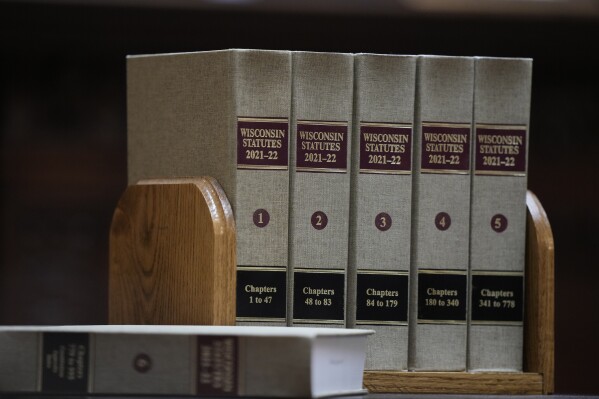Eagerly awaited redistricting reports that will reshape Wisconsin Legislature are due
MADISON, Wis. (AP) — Eagerly awaited redistricting reports that will recommend new maps expected to reshape the balance of power in the Wisconsin Legislature are due to the state Supreme Court on Thursday.
The political stakes are huge in the battleground state where Republicans have had a firm grip on the Legislature since 2011 even as Democrats have won statewide elections, including for governor in 2018 and 2022. Four of the past six presidential victors in Wisconsin have been decided by less than a point.
Under maps first enacted by Republicans in 2011, and then again in 2022 with few changes, the GOP has increased its hold on the Legislature, largely blocking major policy initiatives of Gov. Tony Evers and Democratic lawmakers for the past five years.
The victory last year by a liberal candidate for Wisconsin Supreme Court, who called the current Republican maps “rigged,” cleared the path for the court’s ruling in December that the maps are unconstitutional because districts are not contiguous as required by law.



The court ordered new maps with contiguous district, but also said they must not favor one party over another. Republicans have indicated that they plan an appeal to the U.S. Supreme Court, arguing due process violations, but it’s not clear when that would come.
The consultants reviewed proposed maps submitted by Evers, fellow Democrats, Republicans, academics and others that would reduce the Republican majorities that sit at 64-35 in the Assembly and 22-10 in the Senate.
The consultants on Thursday could recommend adopting one of those proposals, some variation of them, or completely different maps.
It ultimately will be up to the Wisconsin Supreme Court, with a 4-3 liberal majority, to decide which maps to enact. The state elections commission has said that must be done by March 15 to meet deadlines for candidates running in the fall.
Evers on Tuesday vetoed a last-ditch effort by Republicans to enact new lines to avoid the court ordering maps. Republicans largely adopted the Evers maps but moved some lines to reduce the number of GOP incumbents who would have to face one another in the new districts.
Evers rejected it, calling it another attempt by Republicans to gerrymander the districts in their favor.
Under most of the newly proposed maps, Republicans would retain their majorities in the Legislature, but the margin would be significantly tightened, judging by an analysis by a Marquette University researcher.
The Wisconsin Supreme Court has also been asked by Democrats to take up a challenge to the state’s congressional district lines. That lawsuit argues the court’s decision to order new state legislative maps opens the door to challenging the congressional map. Republicans hold five of the state’s eight congressional seats.
The moves in Wisconsin come as litigation continues in more than dozen states over U.S. House and state legislative districts that were enacted after the 2020 census.
Disclaimer: The copyright of this article belongs to the original author. Reposting this article is solely for the purpose of information dissemination and does not constitute any investment advice. If there is any infringement, please contact us immediately. We will make corrections or deletions as necessary. Thank you.




